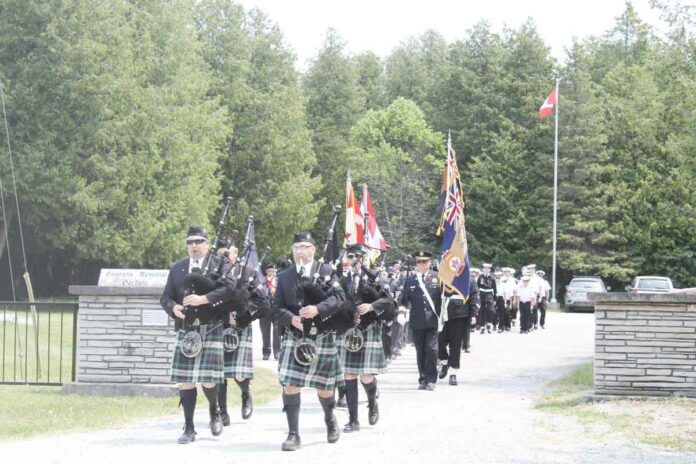HALIFAX—When Mindemoya’s Laurie Landry woke up and looked out the window last week, she was greeted by a sky filled with billowing clouds of grey smoke. Ms. Landry is currently visiting her son Jonathan in Nova Scotia, something she does about twice a year. This year will prove to be among the more memorable of visits as a few moments after looking out the window of her son’s home, the provincial emergency alert began sounding on their cellphones.
For the next several days mother, son and Foxy the dog would find themselves displaced into a Red Cross emergency shelter and wondering about the fate of Mr. Landry’s house.
“We were out the door within 15 minutes,” she said. “There wasn’t any time to waste as the fire was very close.”
Ms. Landry and her son joined over 14,000 people who were evacuated as raging forest fires swept across the province. At last estimates, some 200-plus buildings have been damaged and the fires are far from contained. In fact, with strong winds and no rain relief in sight in the near future, that tally of destruction was expected to rise dramatically in the days to come.
Ms. Landry and her son gathered up Jon’s pet dog Foxy, packed what essentials they could gather in the short time available and set out for the nearest community of Hammond Plains.
“We wound up travelling down a bush road, well, you couldn’t even really call it a road, the car was bottom out all the time,” she said. “We were directed down there as the main Route Hammond’s Road was packed. Normally, there is a chain across the trail to keep out the ATVs, but somebody, I’m guessing an emergency worker, had cut the chain.”
Everyone was tense given the emergency situation, but Foxy was especially anxious. “We were all bouncing around inside the car and we couldn’t open the windows because of the thick smoke. It was really jarring.”
The refugees arrived at the nearest hamlet, Hammond’s Plains, but that community is too small to have much in the way of emergency shelter.
The Red Cross has put in place emergency accommodation at Halifax’s Canada Games Centre and Ms. Landry spent the night, like hundreds of other refugees, sleeping on a cot. Foxy had other arrangements in another area of the sports complex. “Pets couldn’t stay with their owners,” explained Ms. Landry. “Some people are afraid of dogs, and a few are allergic.”
When it comes to hospitality, however, it’s hard to top Canada’s East Coast islanders.
“People have been amazing,” said Ms. Landry. “The Red Cross is helping out people with all kinds of food, clothing and other necessities.”
Foxy is also being kept comfortable. “Foxy is in another area with kennels and there are toys and a couple of people looking after them, feeding them and taking them for walks.”
The hardest part of the ordeal at this point for Ms. Landry and her son was not knowing the status of his house. Given the rapidity of the blaze’s spread and the dense smoke that enveloped them as they left the area, their anxiety is not at all unfounded.

Thankfully, Ms. Landry is reporting that local firefighters have since provided photographs of the house showing that it has passed through the ordeal unscathed. Her son has moved into a cottage and it will likely be a week or so before he can return to his house, there is comfort in knowing that there is still a home to return to.
Holly Scott of Mindemoya is also in Nova Scotia visiting her daughter Leah and the new baby, and she described the incredible level of hospitality being exhibited by Nova Scotians toward their refugee neighbours.
“People were really quick to take on doing what they can, filling in and watching each other’s backs,” she told The Expositor. Ms. Scott is visiting family not far away from where the fires are raging. “We are waiting for the call to be evacuated. We know it may be coming.”
“The skies are grey with smoke,” reported Ms. Scott. Strong winds continue to fan the fires and there were concerns that, although the forest fires were still 10 kilometres away, the unpredictable shifts in the winds could change the fire’s direction in a heartbeat.
With more time to consider choices, Ms. Scott describes the eerie feeling of having to decide what to take and what to leave behind in an evacuation. “There is identification, of course, but when it comes down to it, you realize how little you need to take with you.” With a new baby in the family (a large part of the reason for the trip), diapers and baby bottles figure large in those decisions.
Leah’s husband Michael is a pilot, away a fair bit, and Ms. Scott was there to help with the children.
Ms. Scott noted the many similarities between Nova Scotia islanders and those of Manitoulin—especially in the realm of hospitality and the drive to help those displaced by the fires.
“People have been amazing,” she said. “It is the same kind of hospitality we see on Manitoulin Island.”





